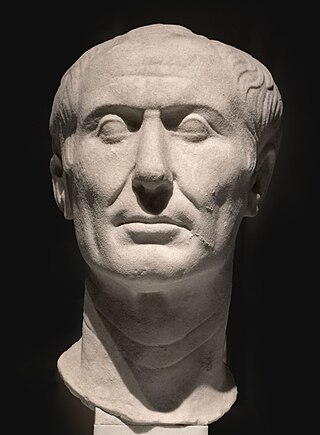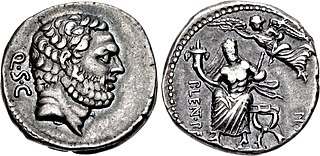Related Research Articles

Gaius Julius Caesar was a Roman general and statesman. A member of the First Triumvirate, Caesar led the Roman armies in the Gallic Wars before defeating his political rival Pompey in a civil war, and subsequently became dictator from 49 BC until his assassination in 44 BC. He played a critical role in the events that led to the demise of the Roman Republic and the rise of the Roman Empire.

Praetor, also pretor, was the title granted by the government of Ancient Rome to a man acting in one of two official capacities: (i) the commander of an army, and (ii) as an elected magistratus (magistrate), assigned to discharge various duties. The functions of the magistracy, the praetura (praetorship), are described by the adjective itself: the praetoria potestas, the praetorium imperium, and the praetorium ius, the legal precedents established by the praetores (praetors). Praetorium, as a substantive, denoted the location from which the praetor exercised his authority, either the headquarters of his castra, the courthouse (tribunal) of his judiciary, or the city hall of his provincial governorship. The minimum age for holding the praetorship was 39 during the Roman Republic, but it was later changed to 30 in the early Empire.

Quintus Fufius Calenus was a Roman Republican politician and general. When Fufius was plebeian tribune in 61 BC he was an ally of Publius Clodius Pulcher during the Bona Dea affair. During his praetorship in 59 BC he supported Julius Caesar who was then consul. Fufius later served under Caesar at the close of the Gallic Wars and during the civil war that followed. For his services he was made consul in 47 BC. After Caesar's death in 44 BC, he supported Mark Antony against Cicero during the ensuing conflict in the senate. As an ally of Antony governing Cisalpine Gaul, he died of illness in 40 BC on the cusp of intervening in the Perusine War.

Publius Cornelius Lentulus Spinther was a Roman politician and general. Hailing from the patrician family of the Cornelii, he helped suppress the Catilinarian conspiracy during his term as curule aedile in 63 BC and later served as consul in 57 BC. Denied the opportunity to invade Egypt the following year, he nevertheless won some victories in his province of Cilicia and celebrated a triumph over it in 51 BC.
Titus Manlius Torquatus was a politician of the Roman Republic. He had a long and distinguished career, being consul in 235 BC and 224 BC, censor in 231 BC, and dictator in 208 BC. He was an ally of Fabius Maximus "Cunctator".
Publius Plautius Hypsaeus was a politician of the Roman Republic during the first century BCE.
Publius Vatinius was a Roman politician during the last decades of the Republic. He served as a Caesarian-allied plebeian tribune in the year 59 – he was the tribune that proposed the law giving Caesar his Gallic command – and later fought on that side of the civil war. Caesar made him consul in 47 BC; he later fought in Illyricum for the Caesarians and celebrated a triumph for his victories there in 42 BC.
Publius Licinius Crassus was a member of the respected and prominent Crassi branch of the plebeian gens Licinia as well as the father of the famous triumvir Marcus Licinius Crassus. His father was Marcus Licinius Crassus Agelastus and his brother Marcus Licinius Crassus served as a praetor in 107 BC.
Marcus Valerius Laevinus was a Roman consul and commander who rose to prominence during the Second Punic War and corresponding First Macedonian War. A member of the gens Valeria, an old patrician family believed to have migrated to Rome under the Sabine king T. Tatius, Laevinus played an integral role in the containment of the Macedonian threat.
Marcus Pupius Piso Frugi Calpurnianus was a Roman senator. Originally a member of the gens Calpurnia, which claimed descent from Numa Pompilius, the second king of Rome, a Calpurnius Piso Frugi, he was adopted by Marcus Pupius, when the latter was an old man. He retained, however, his family-name Piso.
Quintus Caecilius Metellus Nepos was an ancient Roman politician during the Late Republic. He was a son of Quintus Caecilius Metellus Nepos and served as tribune of the plebs in 62 BC, consul in 57 BC, and the governor of Hispania Citerior from 56–55 BC.
The gens Otacilia, originally Octacilia, was a plebeian family at ancient Rome. The gens first rose to prominence during the First Punic War, but afterwards lapsed into obscurity. The first of the family to obtain the consulship was Manius Otacilius Crassus, in 263 BC.
Lucius Calpurnius Piso Frugi was a Roman politician and historian. He created the first permanent jury court in Rome to try cases related to provincial corruption during his plebeian tribunate in 146 BC. He also fought, not entirely successfully, in the First Servile War. He was consul in 133 BC and censor in 120 BC.
Marcus Baebius Tamphilus was a consul of the Roman Republic in 181 BC along with P. Cornelius Cethegus. Baebius is credited with reform legislation pertaining to campaigns for political offices and electoral bribery (ambitus). The Lex Baebia was the first bribery law in Rome and had long-term impact on Roman administrative practices in the provinces.
Titus Otacilius Crassus was a Roman statesman and general during the middle era of the Roman Republic. He was one of the two consuls of 261 BCE, serving with Lucius Valerius Flaccus. During his consulship, he and his consular colleague Flaccus fought against the Carthaginians on Sicily as part of the ongoing First Punic War. Before sailing to Sicily they strengthened the coastal defences of Italy against attacks by Hannibal Gisco, a Carthaginian admiral sent to raid the Tyrrhenian coast. The consuls besieged Mytistraton, but were eventually driven off by Hamilcar, the new commander of Carthage's Sicilian army, who defeated them at Thermae near Palermo. They returned to Italy were they started building Rome's first warfleet, created after Carthaginian example. In 260, the fleet was ready and would be used by Gnaeus Cornelius Scipio Asina, one of the two consuls of that year.
Quintus Ancharius was a politician in the 1st century BCE in Ancient Rome. He was tribunus plebis in 59. He took an active part in opposing the agrarian law of Julius Caesar, and in consequence of his services to the aristocracy of Rome was made praetor in 56, during which time he was a juror in the case of Publius Sestius under Lex Plautia Papiria.
Titus Manlius Torquatus was a politician of the Roman Republic, who became consul in 165 BC. Born into a prominent family, he sought to emulate the legendary severity of his ancestors, notably by forcing his son to commit suicide after he had been accused of corruption. Titus had a long career and was a respected jurist. He was also active in diplomatic affairs; he notably served as ambassador to Egypt in 162 BC in a mission to support the claims of Ptolemy VIII Physcon over Cyprus.
Gnaeus Octavius was a Roman politician and general who served as consul in 165 BC and was the builder of the Porticus Octavia.
Gnaeus Octavius was a politician of the Roman Republic. He was praetor c. 131 BC and consul in 128 BC, but his life is mostly unknown apart from a few inscriptions and an anecdote from Cicero.
References
- ↑ Hoyos, Dexter (17 April 2017). Mastering the West: Rome and Carthage at War. Oxford University Press. p. 138. ISBN 978-0-19-066345-2.
- ↑ Briscoe, John (7 March 2016). "Otacilius Crassus, Titus, Roman praetor, 217 BCE". Oxford Research Encyclopedia of Classics. doi:10.1093/acrefore/9780199381135.013.4627. ISBN 978-0-19-938113-5 . Retrieved 1 April 2020.
- ↑ Hazel, John (26 September 2002). Who's Who in the Roman World. Routledge. p. 88. ISBN 978-1-134-59252-4.
- ↑ Münzer, Friedrich (1999). Roman Aristocratic Parties and Families. Johns Hopkins University Press. p. 72. ISBN 9780801859908.